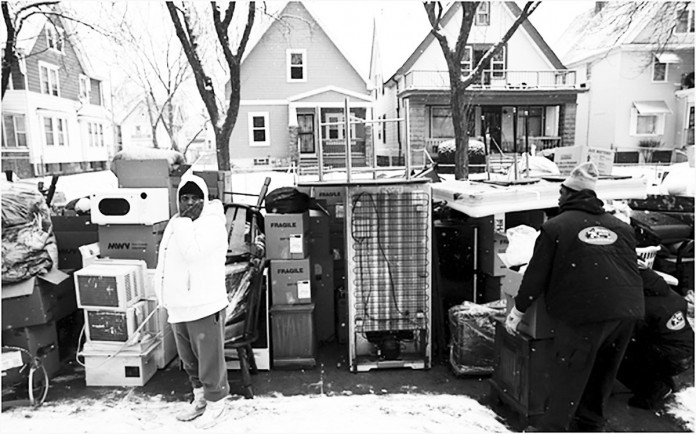
A New York nuisance abatement action, a little-known type of lawsuit that gives the city the power to shut down places it claims are being used for illegal purposes, has been used in cases to evict entire families from their homes and intimidate residents into warrantless searches according to a recent article by Propublica and the New York Daily News.
The nuisance abatement law was created in the 1970’s to combat the prostitution industry in Times Square. Since then, its use has been vastly expanded, commonly targeting apartments and mom-and-pop bodegas, even as the city’s crime rate has reached historic lows. The NYPD files upward of 1,000 such cases a year, nearly half of them against residences. For some landlords, the evictions were a solution to problematic tenants.
The process has remarkably few protections for people facing the loss of their homes.
Three-quarters of the cases begin with secret court orders that lock residents out until the case is resolved. The police need a judge’s signoff, but residents aren’t notified and thus have no chance to tell their side of the story until they’ve already been locked out for days. And because these are civil actions, residents also have no right to an attorney.
Perhaps most fundamentally, residents can be permanently barred from their homes without being convicted or even charged with a crime.
In partnership with ProPublica, the Daily News reviewed 516 residential nuisance abatement actions filed in the Supreme Courts from Jan. 1, 2013 through June 30, 2014. Our analysis also reviewed the outcomes of the underlying criminal cases against hundreds of people who were banned from homes as a result of these actions.
173 of the people who gave up their leases or were banned from homes were not convicted of a crime, including 44 people who appear to have faced no criminal prosecution whatsoever.
Overall, tenants and homeowners lost or had already left homes in three-quarters of the 337 cases for which the Daily News and ProPublica were able to determine the outcome. The other cases were either withdrawn without explanation, were missing settlements, or are still active.
In at least 74 cases, residents agreed to warrantless searches of their homes, sometimes in perpetuity, as one of the conditions of being allowed back in. Others agreed to automatically forfeit their leases if they were merely accused of wrongdoing in the future.
The toll of nuisance abatement actions falls almost exclusively on minorities, our analysis showed. Over 18 months, nine of 10 homes subjected to such actions were in minority communities. We identified the race of 215 of the 297 people who were barred from homes in nuisance abatement battles. Only five are white.
The NYPD has embraced nuisance abatement actions as part of its controversial “Broken Windows” strategy of aggressively pursuing low-level offenders to prevent more serious ones.
The Daily News and ProPublica found that, overall, judges approved the NYPD’s request to temporarily lock out residents in 75 percent of cases.
This decades-old approach — which has introduced large numbers of people of color in New York to the criminal justice system through stop-and-frisks, summonses and misdemeanor arrests — has touched off waves of protests in recent years.
Sidney Baumgarten, the former city official who commissioned the drafting of the nuisance abatement law in the 1970s, said it is now being abused. He is alarmed by the sheer volume of cases, especially those aimed at households in which no one has been convicted of a crime.
“I think it’s wrong. I think it’s unconstitutional. I think it’s over-reaching,” he said. “They’re giving up their constitutional rights. And why? Because they’re afraid they’re going to be evicted from their home, with their children. There’s a certain amount of compulsion, and threat and coercion, by the very nature of the process they’re using.”
To read more of this article go to ProPublica.org.





